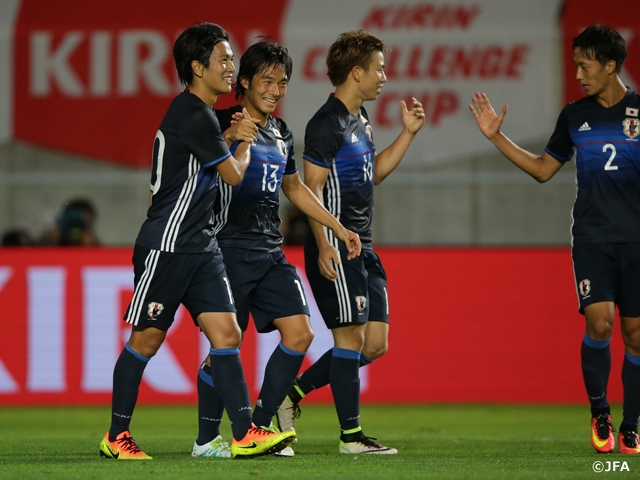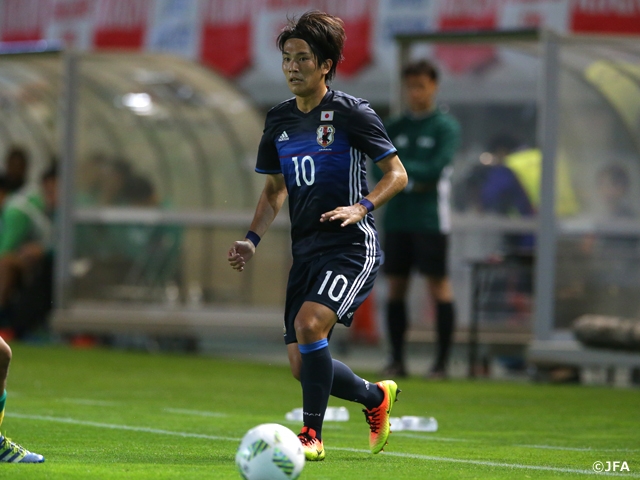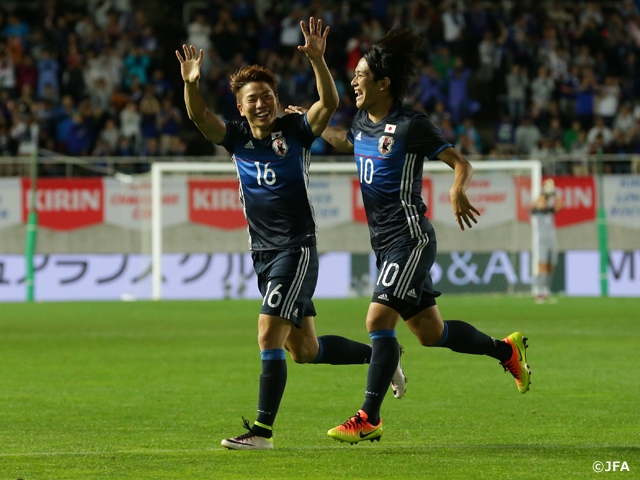NEWS
KIRIN CHALLENGE CUP 2016: U-23 Japan National Team come back to 4-1 win over South Africa
30 June 2016

On Wednesday 29 June, U-23 Japan National Team faced U-23 South Africa National Team at the KIRIN CHALLENGE CUP 2016 held at Nagano General Sports Stadium ALWIN, and two goals by forward NAKAJIMA Shoya (F.C.Tokyo) pushed Japan ahead to a 4-1 come-from-behind win.
For the Japanese squad, it was a simulation for the first match in the Olympics against Nigeria. It was also the last match for them to play solely with U-23 players, with the announcement of the final Olympic roster scheduled on Friday 1 July. Being the last opportunity for the players to showcase themselves, the match showed impressive collective efforts by Japan as well.
South Africa, also destined to play in the Olympics, had fullbacks positioned higher and initiate attacks with speedy dribbling. Their forwards also looked for chances to rush into the box aggressively, as the whole team took the initiative of the match by taking advantage of their athleticism.
Forward ASANO Takuma (Sanfrecce Hiroshima) attempted to utilise the space behind the opposing defenders while defender MUROYA Sei (F.C.Tokyo) and midfielder NOTSUDA Gakuto (Albirex Niigata) went toward goal in the 20th minute. But all of those efforts ended up being off target.
The opening goal was scored by South Africa. In the 30th minute, when defender KAMEKAWA Masashi (Avispa Fukuoka) tried to deny a long ball, he committed a handball in the box. South African forward Gift MOTUPA converted the penalty kick to take the first lead of the match.
But Japan did not panic. They kept aiming at the space behind the opponents. In the 37th minute, midfielder OHSHIMA Ryota (Kawasaki Frontale) moved up for a pass from midfielder YAJIMA Shinya (Fagiano Okayama) and fed it to Nakajima. Nakajima, who later said “we had an eye contact so I thought it would come to me,” composedly put the ball home with his left foot to tie the match.

In the 41st minute, Japan’s clearance was picked up by the opponents, which led forward Thapelo MORENA to fire a shot in close distance. Japan’s goalkeeper KUSHIBIKI Masatoshi (Kashima Antlers), however, showed an outstanding defence to save his team.
Japan gained momentum with the equaliser. In the 45th minute, Yajima took the ball from Nakajima on the opposite side of the pitch and moved it to Muroya rushing up on the right flank. Muroya, who made the first national team match appearance since the AFC Championship held also as the Olympic final qualifiers in January, fed it into the middle where Yajima right-footed it into the back of the net.
Then two minutes later, Asano robbed the opponents’ ball and sent a cross from the right, which was headed into goal again by Nakajima to extend the lead to two goals. It was Nakajima’s 18th career goal for this generational national team which started its activity in January 2014.
Partly due to fatigue from the long trip exposed especially after conceding three goals in a row, South Africa started slowing down. On the other hand, Japan continued motivated offence. Early in the second half, Asano passed by South African defenders and met a long vertical feed from Japan’s backline, and penetrated into the middle and struck a right-footed blast to improve the scoring 4-1.

At the start of the second half, Japan replaced Notsuda with midfielder ITO Junya (Kashiwa Reysol) and midfielder IDEGUCHI Yosuke (Gamba Osaka) with midfielder HARAKAWA Riki (Kawasaki Frontale). Ito was inserted as a forward, which moved Nakajima and Yajima to the left and right winger respectively. Later on, Japan’s bench sent on midfielder HASHIMOTO Kento (F.C.Tokyo), midfielder TOYOKAWA Yuta (Fagiano Okayama) and defender MATSUBARA Ken and forward SUZUKI Musashi (both Albirex Niigata), while any of the team’s rhythm both offensively and defensively and the match dominance did not halt even with substitute members on the pitch.
South Africa also subbed in four players in effort to somehow change the course of the match. Although their offence focused on sending balls forward and to the flanks efficiently with few touches, they were not able to stop making defensive errors and create scoring opportunities. Meanwhile Japan kept aggressive defence until the match finished with the final score of 4-1 in Japan’s favour.
Coach TEGURAMORI Makoto said of the difficulty of determining the final roster for the Olympics, “the result was very fine, but only my mind has some cloud over it. I never expected to struggle at this point (in trimming the roster).” “Just as Nadeshiko Japan become the best team in the world and provided courage and hope to people in the year of the Great East Japan Earthquake, this men’s team strive to show ray of hope for Kumamoto that was devastated by another major earthquake.” Added the coach.
After the final roster is set, Japan’s young national team will have an international friendly against the U-23 Brazil National Team on 30 July local time in Brazil. In the Olympics, they will first face Nigeria on 4 August followed by taking on Colombia on 7 and Sweden on 10.
Coach and Players' Comments
TEGURAMORI Makoto, Coach
In the beginning, the opponents’ superior physicality scared us a little for a while, but we tried to control the game by accepting their strength and looking for their weakness. It worked well, I think. Once our first goal flinched the opponents, we kept attacking right there. There I saw this team’s improvement in terms of reading the course of the match and playing accordingly. We played mainly the players who just came back to the team, but all the 21 players showed their own presence. By the time the Olympics starts, we will improve the way we start off a match, welcome overage players, and raise our speed, power and combinations, all of which can make our football sharper.
FW #13 NAKAJIMA Shoya (F.C. Tokyo)
I am very happy more with the fact that our team won than I scored goals. I was looking to touch the ball often to take advantage of Asano’s speed. Me personally, there were some aspects where I did well and also others where I wasn’t good enough. I want to keep correcting them in practice.
DF #2 MUROYA Sei (F.C. Tokyo)
That was the first time for me to play 90 minutes and it was a little tough in the end, but playing through it raises my confidence level. I personally didn’t play very well overall, so making an assist made that up a little. It was good that the whole team were calm and dealt with it nicely after we allowed a goal.
DF #5 UEDA Naomichi (Kashima Antlers)
At first we were trying to see how they come at us. They tried to attack with dribbles, and we as a team tended to stay back a little. After allowing a goal, we told each other to put pressure up front. But it was late for us to say that, and the way we allowed a goal and the way we started the match are something we need to work on from now. I want to keep practising to raise our accuracy for the Olympics.
MF #10 YAJIMA Shinya (Fagiano Okayama)
We should have kept our defence more compact overall against the opponents who were physically more gifted. (About the Olympic roster) All I can do is wait. Even if I don’t get selected, what I have done so far will be beneficial for my future career and I think I will have to take advantage of it.
Owen DA GAMA, Coach (U-23 South Africa National Team)
We were moving well for the first twenty minutes. But due to the long trip and fatigue from the previous match we recently played, our players were slow. The first and last 10 minutes are particularly important, but they attacked us off guard there. The plays by #13 (Nakajima) confused us. Japan were more skilled than us and wonderful in organised discipline.
TASHIMA Kohzo, President of the Japan Football Association
The players played with sense of urgency and every single player was showing what he could do in order to get picked for the Olympics roster. I think that resulted in this win. How we play in the first match determines the whole outcome of a tournament. I want them to get well prepared and start off well at the first match in Manaus.
JFA-TV (Japanese version only)
Schedule
| Sun. 26 June | 16:30 | Training (@Shinshu Skypark Turf Ground) *Open to the public |
|---|---|---|
| Mon. 27 June | 16:00 | Training (@Shinshu Skypark Turf Ground) *Open to the public |
| Tue. 28 June | PM | Official Training *Closed-door |
| Wed. 29 June | 4-1 | KIRIN CHALLENGE CUP 2016 vs U-23 South Africa (@General Sports Stadium ALWIN) |
*The schedule is subject to change due to the team condition, the weather, etc.
KIRIN CHALLENGE CUP 2016
U-23 Japan National Team vs U-23 South Africa National Team
Wed. 29 June 2016 kick off 19:30 (tbd)
Nagano/General Sports Stadium ALWIN
Related Information
Related News
-
National Teams
“We want to take our power to Rio de Janeiro” says U-23 Japan’s Coach TEGURAMORI prior to the KIRIN CHALLENGE CUP 2016 match against U-23 South Africa

-
National Teams
U-23 South Africa National Team arrive in Japan - KIRIN CHALLENGE CUP 2016 vs. U-23 Japan National Team (6/29@Nagano/General Sports Stadium ALWIN)

-
National Teams
J2 players join U-23 Japan National Team for KIRIN CHALLENGE CUP 2016 against U-23 South Africa

-
National Teams
U-23 Japan National Team start preparation for last domestic game prior to Olympics

Latest News
-
National Teams
2024/04/17
【Match Report】U-23 Japan National Team win first group-stage match despite playing with 10 men following first-half sent-off - AFC U23 Asian Cup Qatar 2024™

-
National Teams
2024/04/12
U-17 Japan Women's National Team squad & schedule - AFC U17 Women's Asian Cup™ Indonesia 2024 (4/27~@Chiba, 4/29~@Thailand, 5/3~@Indonesia)

-
Referees
2024/04/05
YAMASHITA Yoshimi, TESHIROGI Naomi, and BOZONO Makoto named to officiate matches in the Games of the XXXIII Olympiad (Paris 2024)

-
National Teams
2024/04/04
U-23 Japan National Team squad & schedule - AFC U23 Asian Cup Qatar 2024™ (4/6-5/4@Doha, Qatar)

-
National Teams
2024/03/30
Regarding the decision of the FIFA Disciplinary Committee - FIFA World Cup 26™ / AFC Asian Cup Saudi Arabia 2027™ Preliminary Joint Qualification Round 2 vs DPR Korea (3/26@Pyongyang)


 Japan National Team
Japan National Team
